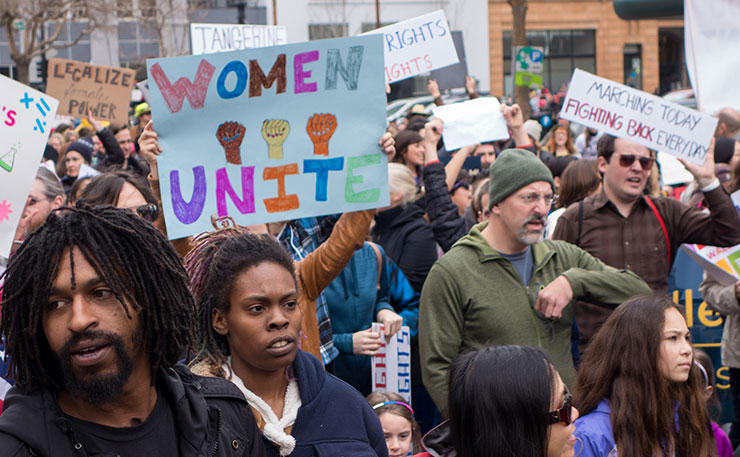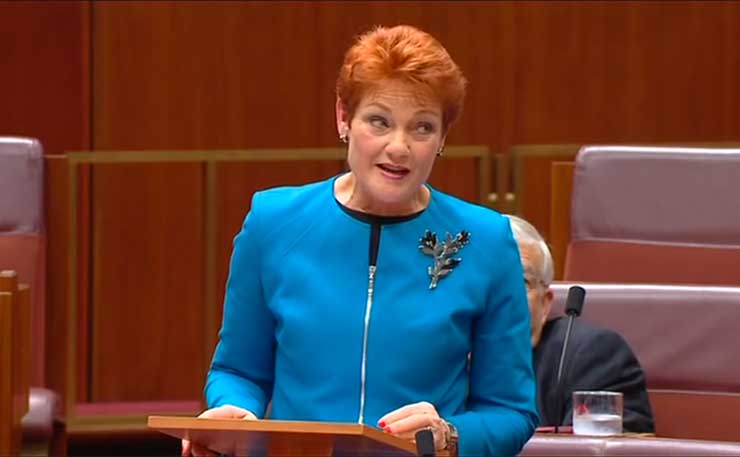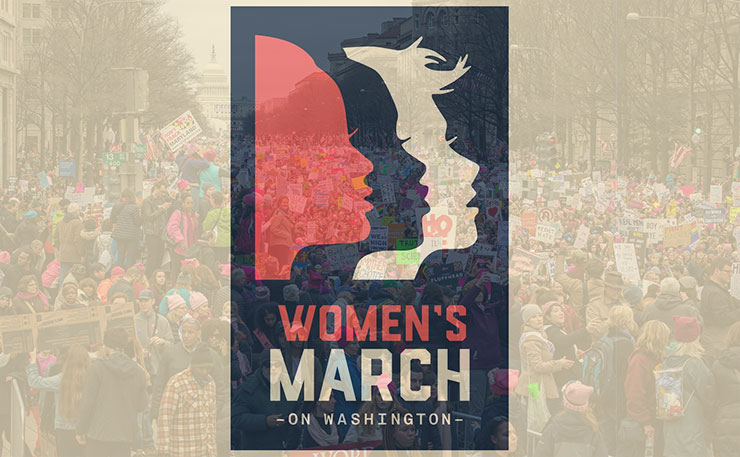Weekend protest marches around the globe have ignited and inspired millions. But something is still missing, writes Cat Moir.
Sydney women’s march on Saturday saw thousands of people take to the streets to protest against sexism, racism, homophobia and bigotry in the aftermath of Donald Trump’s inauguration. It was one of 600 marches around the world held in solidarity with the Women’s March on Washington D.C.
The huge crowd united people of all ages, genders, sexualities, and cultural backgrounds. The common cause: feminism, and it was so encouraging to hear speakers and marchers recognise how the experience of being female is affected by race, sexuality, and disability.
Loud and proud feminism is back, in a new intersectional guise, and that is something that can only be welcomed. As the MC said at one point: women today are no longer ashamed to say the F-word.
But there was another word that was missing for me on Saturday’s podium, and that was the C-word: class. Growing up in an ex-mining family in the UK, I know how much a lack of resources restricts your opportunities.

As a kid I was bullied at my state school for being too keen to learn, so aged 12, I enrolled in a grammar school on a part-scholarship. It was often a struggle for my single working mum to find money for the rest of the fees, but we thought that education would be a route to a better life.
In some ways it was, and I was no longer bullied for being smart. But instead I, like other scholarship kids, was looked down on for being poor. When I couldn’t afford to go on a school trip, one boy (the son of a wealthy businessman), who until that point I had thought was my friend, took money out of his wallet and threw it at me, jeering.
That’s when I first understood what being working class meant: fewer chances, and sometimes scorn from those with more.
Class isn’t a very fashionable word these days, and it’s little wonder. After all, it is produced by economic inequality, and to get rid of that would mean redistributing wealth throughout society. Today that sounds radical, even if not so long ago it was a mainstream political demand.
The welfare measures and progressive taxation systems most rich countries had adopted by the mid-twentieth century might be the minimum a fair society should provide for its citizens (all of whose labour is of equal value in creating wealth). But today we are struggling to protect those things from deregulation and dismantlement.
Why should feminists care about class? Intersectional feminism teaches us that while women are generally at a disadvantage in neoliberal society – we earn less, do the most unpaid domestic and emotional labour, and are frequently subjected to verbal and physical violence – being a woman of colour, a disabled woman, or a trans woman makes life harder still.

But it’s important not to forget that these experiences are made even more difficult if you are poor. To put it another way, it’s much easier to be recognised as a trans woman and get access to appropriate services if you’re Caitlyn Jenner than it is if you’re a First Nations sistergirl living in the NT. And we must acknowledge that this is not only a question of racial privilege: it’s about wealth.
It can be difficult for progressives to understand the mass appeal of people like Donald Trump, Nigel Farage, or Pauline Hanson. Why would anybody vote for those who encourage division, hate, and prejudice? Maybe one of the reasons is that these figures all claim to offer people increased economic equality and the ability to participate in social life that this implies.
The problem with this new social nationalism, of course, is that it is bought at a price: they say, we’ll reward you, the ‘real’, hard-working Brits, Americans, Australians etc., but not those other, unproductive folks who are a drain on the system. Those ‘other folks’ are usually immigrants, hence the appeals to racism, but they are also often women (single mothers on benefits, for example).
The One Nation-style demonization of immigrants, refugees, and welfare recipients as ‘scroungers’ is of course a cheap tactic. Migration represents an overall net benefit to countries like Australia. Meanwhile in the UK, tax fraud, much of it corporate, makes up 69 per cent of public service fraud compared to 2 per cent for the much-maligned ‘benefit cheats’.
But that’s not even the point: I for one would rather have a thousand people mooch off my tax dollar than see a single person in need of food, shelter, or healthcare go without it. I’ve been the one in need in the past, and could be again tomorrow.

The Donald Trumps of the world don’t really want to give people economic equality. They want to keep the system exactly as it is, because they benefit from it. Sometimes telling people you’re changing things is the best way to keep them the same. Keeping the system going means reproducing it, which is easier if we can be convinced that traditional heterosexual relationships are the ‘norm’.
That’s why someone like Trump and his advocates don’t discourage – and often actively encourage – sexist and homophobic attitudes.
Still, right populists these days are usually not so stupid as to alienate voters by appealing openly to crude prejudices. As Theresa May recently told the UK Conservative Party, she wants a ‘country that works for everyone’. In her vision, your gender, ethnicity, sexual orientation don’t matter. Just as long as you can pay your way, and don’t challenge a neoliberal system that benefits a large proportion of politicians, but not the majority of the population.
But challenging neoliberalism is essential if we want to tackle racism, sexism, and homophobia (not to mention climate change – a threat that radically transcends differences in class, race, gender, even species, and depends on the profit-driven extraction of fossil fuels).
If we don’t talk about economic inequality, the bigots will keep winning.
For me, being a feminist means standing up for a politics that both rejects hate and prejudice in all its forms, and wants prosperity for everyone, not just a few.
For me, being a feminist means not being afraid to say the C-word.
Donate To New Matilda
New Matilda is a small, independent media outlet. We survive through reader contributions, and never losing a lawsuit. If you got something from this article, giving something back helps us to continue speaking truth to power. Every little bit counts.





